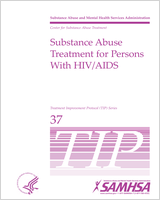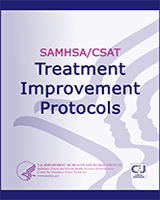NCBI Bookshelf. A service of the National Library of Medicine, National Institutes of Health.
This publication is provided for historical reference only and the information may be out of date.
This TIP Treatment for HIV-Infected Alcohol and Drug Abusers presents guidelines for creating a comprehensive, integrated system of care for HIV-infected AOD abusers. The guidelines identify a spectrum of core services and treatment approaches that ideally should be available to this population regardless of the setting in which care is provided. Prevention and treatment of AOD abuse and HIV disease require a multidisciplinary approach that relies on the strengths of a variety of providers and treatment settings. For service providers who may not be familiar with the treatment system, the TIP provides an overview of AOD treatment settings. An extensive chapter is included, primarily for physicians, nurses, and other medical care providers, on the scope of medical care needed by HIV-infected persons. Another chapter describes the mental health and other counseling needs of HIV-infected substance abusers and provides guidelines for meeting the needs effectively. A chapter on social service needs addresses issues of housing, family support, and outreach services. The TIP describes linkages and collaborations that AOD programs must form with community service providers to provide an array of services. Finally a separate chapter addresses key legal issues, such as confidentiality, encountered in providing services to HIV-infected persons.
Contents
- What Is a TIP?
- Consensus Panel
- Foreword
- Chapter 1 - The HIV Challenge to AOD Treatment
- Chapter 2—Overview of AOD Treatment Services
- Chapter 3 - Primary Medical Care for HIV-Infected AOD Abuse Patients
- Barriers to Care for HIV-Infected AOD Abuse Patients
- Achieving Integration of Care
- Models of Medical Care for An AOD Abuse Population
- Medical Standards of Care
- HIV-Related Primary Care
- Prophylaxis Against Opportunistic Infections
- Special Clinical Issues
- Infection Control Issues for AOD Abuse Treatment Programs
- Issues in Engagement and Adherence to Medical Care For AOD Abusers
- Program and Policy Issues
- Chapter 4—Mental Health and Counseling Needs of HIV-Infected AOD Abusers
- Chapter 5—Social Services for HIV-Infected AOD Abusers
- Chapter 6—Linkages and Services Integration: Policy and Implementation
- Chapter 7 - Key Legal Issues in HIV/AIDS and AOD Abuse Treatment
- Appendix A -- Bibliography
- Appendix B—Summary of Block Grants: Interim Final Rule (1993)
- Appendix C—Elements of a Needle Exchange Program
- Appendix D—Cultural Proficiency Questionnaire
- Appendix E - Information About the Ryan White Comprehensive AIDS Resources Emergency Act of 1990 (The CARE Act)
- Appendix F—Standards of Care
- Appendix G—National HIV/AIDS Organizations and Hotlines
- Appendix H—Sample Memorandum of Understanding
- Appendix I - Federal Resource Panel
- Appendix J—Field Reviewers
This publication is part of the Substance Abuse Prevention and Treatment Block Grant technical assistance program. This publication was written under contract number ADM 270-91-0007 from the Center for Substance Abuse Treatment of the Substance Abuse and Mental Health Services Administration (SAMHSA). Anna Marsh, PhD, and Sandra Clunies, MS, served as the CSAT Government project officers. Duiona R Baker, MPH, was the Government content advisor. Carolyn Davis, Joni Eisenberg, Alan Gambrell, Randi Henderson, Coralee Hoffman, Mim Landry, and Deborah Shuman served as writers.
The opinions expressed herein are the views of the consensus panel members and do not reflect the official position of CSAT or any other part of the U.S. Department of Health and Human Services (DHHS). No official support or endorsement of CSAT or DHHS for these opinions or for particular instruments or software that may be described in this document is intended or should be inferred. The guidelines proffered in this document should not be considered as substitutes for individualized patient care and treatment decisions.
- Policy versus practice: comparison of prescribing therapy and durable medical equipment in medical and educational settings.[Pediatrics. 2004]Policy versus practice: comparison of prescribing therapy and durable medical equipment in medical and educational settings.Sneed RC, May WL, Stencel C. Pediatrics. 2004 Nov; 114(5):e612-25.
- Integrated prevention services for HIV infection, viral hepatitis, sexually transmitted diseases, and tuberculosis for persons who use drugs illicitly: summary guidance from CDC and the U.S. Department of Health and Human Services.[MMWR Recomm Rep. 2012]Integrated prevention services for HIV infection, viral hepatitis, sexually transmitted diseases, and tuberculosis for persons who use drugs illicitly: summary guidance from CDC and the U.S. Department of Health and Human Services.Centers for Disease Control and Prevention (CDC). MMWR Recomm Rep. 2012 Nov 9; 61(RR-5):1-40.
- Clinical and behavioral characteristics of adults receiving medical care for HIV infection --- Medical Monitoring Project, United States, 2007.[MMWR Surveill Summ. 2011]Clinical and behavioral characteristics of adults receiving medical care for HIV infection --- Medical Monitoring Project, United States, 2007.Blair JM, McNaghten AD, Frazier EL, Skarbinski J, Huang P, Heffelfinger JD. MMWR Surveill Summ. 2011 Sep 2; 60(11):1-20.
- Review The Tuberculosis Epidemic: Legal and Ethical Issues for Alcohol and Other Drug Treatment Providers[ 1995]Review The Tuberculosis Epidemic: Legal and Ethical Issues for Alcohol and Other Drug Treatment ProvidersCenter for Substance Abuse Treatment. 1995
- Review Integrating multiple programme and policy approaches to hepatitis C prevention and care for injection drug users: a comprehensive approach.[Int J Drug Policy. 2007]Review Integrating multiple programme and policy approaches to hepatitis C prevention and care for injection drug users: a comprehensive approach.Birkhead GS, Klein SJ, Candelas AR, O'Connell DA, Rothman JR, Feldman IS, Tsui DS, Cotroneo RA, Flanigan CA. Int J Drug Policy. 2007 Oct; 18(5):417-25. Epub 2007 Feb 20.
- Treatment for HIV-Infected Alcohol and Other Drug AbusersTreatment for HIV-Infected Alcohol and Other Drug Abusers
Your browsing activity is empty.
Activity recording is turned off.
See more...

